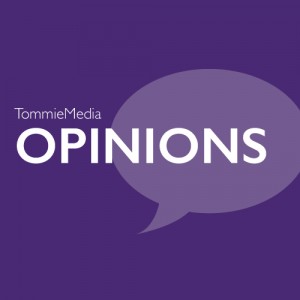“That’s so gay!” a frustrated student mutters as he looks down at the red marks on his returned exam. You’ve probably heard this remark at some point in a class or around friends. You might even admit to saying it yourself. In this situation, the student is not talking about being happy or elated, nor is he speaking about a person who is gay. He is talking about a test and insinuating negative connotations about the word gay by describing the test as something stupid or worthless. That’s not OK.
There are so many terms in modern language that have negative connotations added to them by society. A phrase originally used to describe an individual or a group of people gets twisted in a negative, degrading way. This derogatory language has been normalized and, in some cases, accepted through repeated use. Some people continue to use these phrases toward people in a demeaning way or even use them in a joking manner to describe situations or inanimate objects.
It is important to think about what words you are using to describe people, whether it is about their sexual orientation and gender, race or physical ability. Words that are used in a derogatory way hurt other people, even if you aren’t trying to hurt them or don’t believe in the negative stereotypes and stigmas associated with the word.
A YouTube video titled “When Is It Okay to Say the R-Word?” produced by Mic and Liz Plank features a story about a boy named Paul who has Down syndrome. His mother, Margaret, explains to Plank why using the r-word is disrespectful, even when she knows people are not directly referring to her son.
“They’re not talking about my son directly, but when they use the r-word, it’s in a very negative way,” Margaret said. “It’s used to make fun of people, to ridicule, so it’s hurtful.”
By using these words in a disrespectful manner, and even in a casual manner, you perpetuate the negative connotations of the word, labeling it as negative or bad, even if that is not what you mean or believe. It is important to stay up-to-date about what terms are currently accepted. The National Center on Workforce and Disability website provides helpful guidelines about terms to describe people with disabilities, which terms are outdated and even the reasons why the old terms are not used anymore.
What people of different races, varying sexual orientations and people with disabilities share is that they are marginalized groups and the terms used to describe them have become stigmatized in society.
Some people prefer certain terms be used when addressing them. Joe Kort, a psychotherapist and leading expert on sex and relationships, describes in an article on his website how some of his clients identify with different terms.
“I don’t personally like to use the term homosexual. But when my clients identify themselves as ‘homosexual’ and dislike the terms gay or lesbian, then that’s the word I use,” Kort said.
If you are ever confused about how to describe someone, ask what term they identify with or prefer. There is some dispute about what words can be used in a casual manner, such as the word ‘crazy’, which can signify something outrageous or exciting, but was at one time used to describe someone with an emotional or behavioral disorder. If you find yourself thinking a word could have negative connotations or could be hurtful to someone, then the best option would be to use a different term.
So why am I, someone who does not identify with any of the examples listed, speaking about using socially acceptable terms when they might not impact me personally? Because any language can have a major impact on the people around us. It is always important to be respectful to others, and that means making sure what you are saying is acceptable.
Claire Noack can be reached at noac8702@stthomas.edu.


